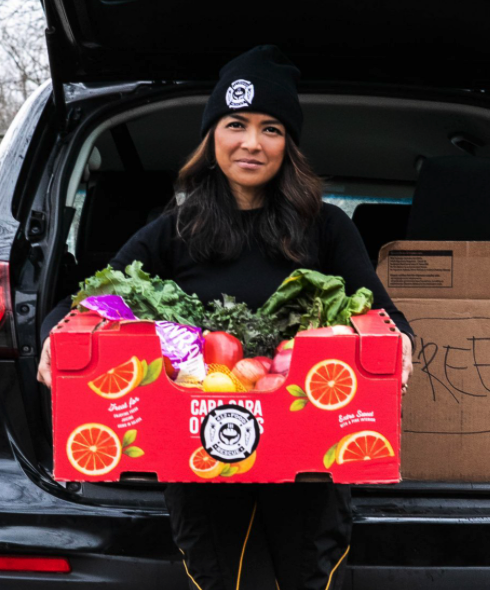Get Pittsburgh: Leah Lizarondo Wants to Feed the World
Article by Pittsburgh Technology Council and The Machine
 One in nine Americans struggles with hunger and over 14 million American households are food insecure, according to a Feeding America Hunger study. These stats become all the more chilling when you consider that about 40 percent of all food in this country goes to waste. Let that sink in - 11 percent of Americans go hungry every year and 11 percent of American households feel food insecure, while a staggering 40 percent of the food we produce and distribute ends up in landfills. Now here’s some food for thought, how do you figure out a way to redirect all that good food to those who need it? That’s exactly what Leah Lizarondo, CEO of 412 Food Rescue, set out to do when she co-founded the tech non-profit.
One in nine Americans struggles with hunger and over 14 million American households are food insecure, according to a Feeding America Hunger study. These stats become all the more chilling when you consider that about 40 percent of all food in this country goes to waste. Let that sink in - 11 percent of Americans go hungry every year and 11 percent of American households feel food insecure, while a staggering 40 percent of the food we produce and distribute ends up in landfills. Now here’s some food for thought, how do you figure out a way to redirect all that good food to those who need it? That’s exactly what Leah Lizarondo, CEO of 412 Food Rescue, set out to do when she co-founded the tech non-profit.
Leah started her career in consumer packaged goods working for Colgate Palmolive in New York when suddenly she saw the first dot-com boom happening before her very eyes and decided to switch to tech joining a software company in a product management role. “That’s when I first learned about product management in the software sense, which is different from the product management in packaged goods. I loved how quickly technology can move. I decided to transition to technology and that’s when I decided to go to Carnegie Mellon. I also wanted to focus on technology for good, so I went to Heinz School of Public Policy instead of Tepper.” While raising her kids in Pittsburgh, she took a little time off and then moved into the non-profit sector. “So I now had experience in packaged goods, technology and non-profit, and 412 Food Rescue is kind of an agglomeration of the three.”
Around 2012 the National Rescue Defense Council published a report called “Wasted,” and that was the tipping point for Leah to build and launch a new, more agile model that would leverage technology to address an issue food banks across the country were struggling with. “All of us have this idea that we’re wasting food but don’t know the extent of it and this was the first report that basically said we’re wasting almost half of our food supply. For me, that was extremely shocking and it was an interesting problem. Why is food going to waste? Where is it going to waste? Why is it not getting redirected? After looking at it, I really understood it’s a big logistics and distribution problem. A new model had to be built to make it cost effective. Uber and ride-share services were starting with the technology that supports these big fleets of vehicles without any physical presence. You don’t have to have a lot, you don’t need to check in. So we decided to take the model, if you can mobilize hundreds of thousands of cars and drivers using technology we can do the same. And lo and behold, delivery services are now the biggest segment of these platforms, so 412 Food Rescue functions the same way but for a different cause.”
While the non-profit started in Pittsburgh, they built a platform that could be licensed and leveraged elsewhere. “How do you build this volunteer network and ensure that it’s reliable enough for stakeholders to depend on? Like when we order using DoorDash, we know it’s going to come. So we want the same reliability. It’s about understanding how to raise awareness, how to drive consumers to opt in and actually participate. That’s truly the magic of the platform, which is called Food Rescue Hero. This differs from a traditional food bank model, where you have a fleet of trucks and a warehouse delivering large orders to a finite list of designations. Our platform, with no warehouse or fleet of trucks, allows them to distribute an exponentially higher number of destinations, not limited by a truck.”
Read Leah's entire profile at our sister site getPGH.com and check out other people doing amazing work in our tech ecosystem.